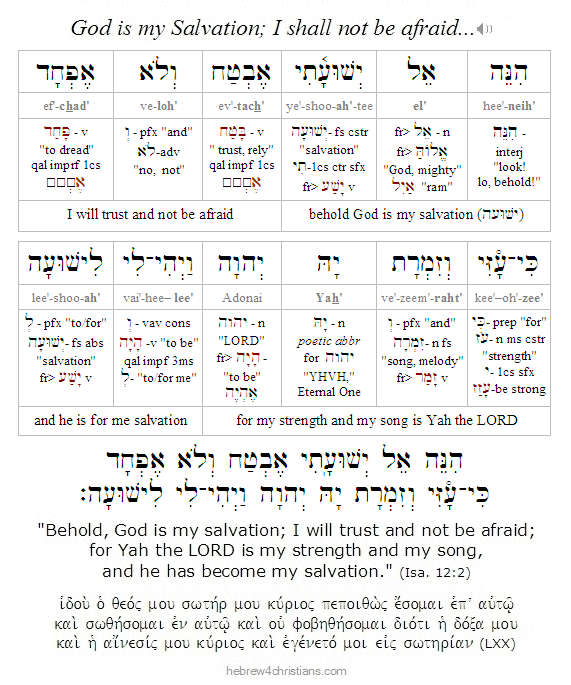|
Jewish tradition counts 49 days from the Passover/Exodus to the revelation at Sinai, a seven week period of purification and preparation... During this time the Israelites carried the bones of Joseph (עַצְמוֹת יוֹסֵף) -- the Hebrew word for "bones" (i.e., etzem: עֶצֶם) also refers to his "essence," or the deep conviction Joseph had in God's promise (Gen. 50:25; Heb. 11:1). The journey into the desert is meant to test us – to reveal our strengths and weaknesses. We cross over from the "comfort of slavery" to a barren place that exposes what lurks within our hearts. Yeshua likewise was tempted in the desert and overcame the devil there (Matt. 4:1-11).
The sages say that the verse: "The LORD is my strength and my song (עָזִּי וְזִמְרָת יָהּ), and he has become my salvation (וַיְהִי־לִי לִישׁוּעָה)," refers to two aspects of the life of faith (Exod. 15:2). "My strength and song" refers to the decision we make to desire freedom, truth, righteousness, and so on, whereas "he has become my salvation" refers God's power, our surrender to his love, and our rest in him... It is the balance (and tension) of these two – the willingness to choose and the decision to surrender – that marks the walk in the desert (Phil. 2:13-14). We are both totally responsible yet utterly unable to help ourselves, and stressing either our own freedom or God's sovereignty disrupts the partnership and unity of our journey. It is not a matter of resolute willing nor a matter of passivity: We exercise our strength by trusting God through the darkness and emptiness of the desert.
This balance may be illustrated in the commandment concerning the manna, the miraculous sustenance given to us each day (Exod. 16:1-30). We can only rightfully gather what we can eat for the day, and if we try to gather more, the gift itself will rot... This teaches us to appreciate the present without fear of the future. The "Torah of Manna" (תּוֹרַת הַמָּן) is that we must gather only what the moment requires and no more: "Give us this day our daily bread," as Yeshua taught us to pray. On the sixth day we are able to gather a double portion so that we are free to focus on God's presence and provision on Shabbat.
Notwithstanding the miracle of our redemption and crossing the sea into newness of life, we journey until hunger and thirst arrest our way -- when the bread we carry is exhausted and the water we find tastes bitter. This "bitter water" represents the pain of our past, the reflux of our wounded heart, and our need for "sweet water," the healing waters of life (מַיִם חַיִּים) we taste at Elim. The mysterious tree that Moses used to sweeten the bitter wates stands for the Tree of Life (עֵץ הַחַיִּים), which itself foreshadows the tree (cross) of our Savior. Bitterness is overcome when touched by this tree. And this tree represents the sacred ground where heaven and earth intersect, the place of atonement, where the heart of God pours our his heart for our eternal good.
Hebrew Lesson
Isaiah 12:2 reading (click for audio):

|



